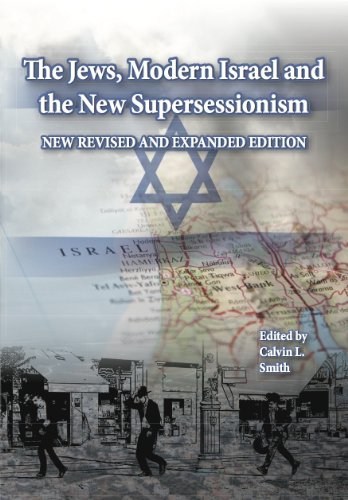The Jews, Modern Israel and the New Supercessionism, reviewed by Kevin Williams
 Calvin L. Smith, ed., The Jews, Modern Israel and the New Supercessionism: Resources for Christians (King’s Divinity Press), 164 pages, ISBN 9780956200600.
Calvin L. Smith, ed., The Jews, Modern Israel and the New Supercessionism: Resources for Christians (King’s Divinity Press), 164 pages, ISBN 9780956200600.
Finally—a single book that treats Replacement Theology, Israel, and the Jewish people with respect, reason, and biblical integrity. Over many years working with Christians I have encountered too many who will ardently profess that they are not anti-Semitic, yet continue to hold to the premise that the universal Church supplants biblical Israel. Consider for a moment how that must make the average Jewish man or woman feel to be told that God is done with them, that their role in God’s plan has ceased, that the blessings in the Bible proclaimed for Israel have been transferred to the church, and you begin to realize how thoroughly anti-Semitic this theology is.
The Jews, Modern Israel and the New Supercessionism (American spelling: Supersessionism) takes a multi-faceted approach to Replacement Theology to help set the record straight. Editor Calvin L. Smith has collected works from a number of scholars, all of which were submitted for a weekend conference at the King’s Evangelical Divinity School in England. As Smith writes, “A series of papers were presented which, while academic in nature, were designed to be accessible to everyday Christians.”
That goal was achieved. In chapters such as “Who is the ‘Israel’ of Romans 11:26?,” “Apostolic Jewish-Christian Hermeneutics,” and “Israel and the Purposes of God”—to name a few—readers are given a well-rounded background in how Protestants derived their supersessionistic doctrines. These doctrines are then graciously dissected, discussed, and debunked.
There is a great deal of common sense as well. In Smith’s contributions in chapters two and seven: obvious, and not-so-obvious facts about the nation of Israel are brought to light, giving the reader new concepts to consider. He also handles “multiple fulfillments of prophecy” nicely, helping readers understand that prophecy does not have to be locked into an either this/or that dimension.
I was grateful for Andy Cheung’s chapter on “Who is the ‘Israel’ of Romans 11:26?” His examination of how Paul uses the word “Israel” to help us grasp the underpinnings of this epistle is well presented. I do, however, wish some time had been given in the book to verse 11:25 as well with a presentation on the implications of, “until the fullness of the Gentiles has come in.”
Category: In Depth, Summer 2010



